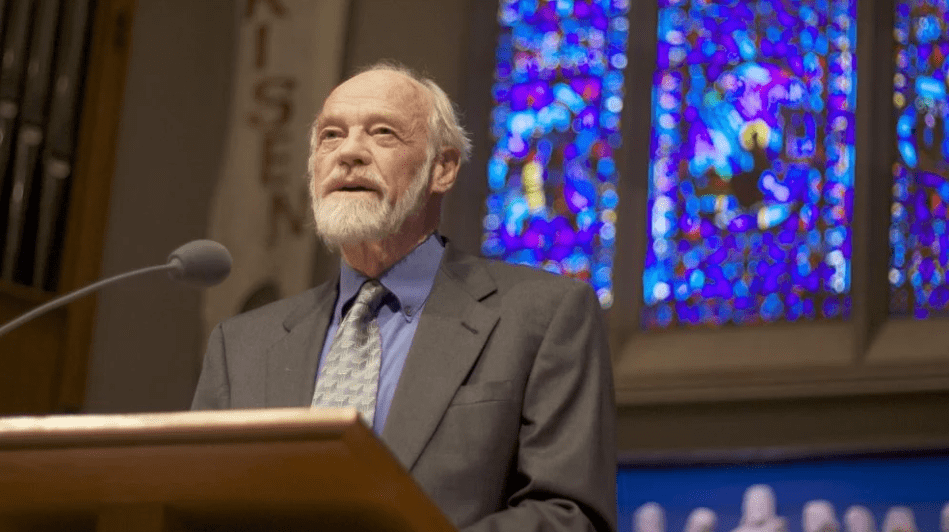Beloved pastor and best-selling author Eugene Peterson has died at the age of 85 overnight. According to his family, his last words were “Let’s go.”
Peterson is best known for his work producing The Message: The Bible in Contemporary Language, a paraphrase of the Bible for which he won a Gold Medallion Book Award. Yet Peterson achievements are noteworthy as a pastor, author, scholar and poet.
“It feels fitting that his death came on a Monday, the day of the week he always honored as a Sabbath during his years as a pastor,” his family’s statement said.
“After a lifetime of faithful service to the church — running the race with gusto — it is reassuring to know that Eugene has now entered into the fullness of the Kingdom of God and has been embraced by eternal Sabbath.”
A week ago, Peterson’s family announced he had entered hospice care due to complications of heart failure and dementia after taking “a sudden and dramatic turn in his health caused by an infection.” Peterson leaves behind his wife of almost 60 years Jan, his three children and six grandchildren.
Born on November 6, 1932 in East Stanwood, Washington, USA, Eugene H. Peterson grew up in Kalispell, Montana. He founded Christ Our King Presbyterian Church in Bel Air, Maryland in 1962, where he served for 29 years before retiring in 1991.
As a scholar, he earned his B.A. in philosophy from Seattle Pacific University, a Bachelor of Sacred Theology from New York Theological Seminary, and a Masters in Arts in Semitic languages from Johns Hopkins University, along with a host of honorary doctoral degrees. He was Professor of Spiritual Theology at Regent College in Vancouver, British Columbia until retiring in 2006.
Yet his life was not without controversy, as Peterson repeatedly fled the grasp of tribalism and frustrated those who sought to categorise him.
Contemporary church types loved him for the work he did to bring the Bible to life in The Message, becoming avid readers and quoters, often times in parallel with a literal translation, such as the English Standard Version.
“I think one of the primary motives behind The Message was an attempt to find new metaphors for metaphors that had become clichés. I translated ‘mustard seed’ as ‘pine nut.’ You wouldn’t believe how much objection I got to that. ‘It’s not what the Bible says,’ people said. I’ve never seen a mustard seed, but I’ve seen a lot of pine nuts,” said Peterson in an interview with Image Journal.
Many Christians who grew up reading and hearing the Bible found Peterson’s work shone a new light on familiar scriptures and reawakened the imagination.
The Message’s influence echoes through modern worship songs, as lyrics like “I’m caught in the rhythms of grace… realigning each step that I take” reflected Peterson’s paraphrase of Matthew 11:28-30:
“Are you tired? Worn out? Burned out on religion? Come to me. Get away with me and you’ll recover your life. I’ll show you how to take a real rest. Walk with me and work with me—watch how I do it. Learn the unforced rhythms of grace. I won’t lay anything heavy or ill-fitting on you. Keep company with me and you’ll learn to live freely and lightly.”
Despite producing a text that was so warmly embraced by contemporary churches, Peterson delivered a stinging critique of modern church methods, asserting “The vocation of pastor(s) has been replaced by the strategies of religious entrepreneurs with business plans.”
I don’t think that brothers and sisters in the kingdom of God should fight. I think that’s bad family manners. — Eugene Peterson
“Churches are not franchises to be reproduced as exactly as possible wherever and whenever — in Rome and Moscow and London and Baltimore — the only thing changed being the translation of the menu.”
Peterson was a lover of classic texts who mined Dostoevsky, Dickinson and Hopkins for theological insight and inspiration. But when all was said and done, he was quick to question scholarly insight that didn’t work in practical ministry.
His response to the “hellgate” controversy around Rob Bell’s book ‘Love Wins’ (which he endorsed) is a case in point:
“Rob Bell and anyone else who is baptised is my brother or my sister. We have different ways of looking at things, but we are all a part of the kingdom of God. And I don’t think that brothers and sisters in the kingdom of God should fight. I think that’s bad family manners.
“I don’t agree with everything Rob Bell says. But I think they’re worth saying. I think he puts a voice into the whole evangelical world which, if people will listen to it, will put you on your guard against judging people too quickly, making rapid dogmatic judgments on people. I don’t like it when people use hell and the wrath of God as weaponry against one another.”
The most recent controversy to snag Peterson happened in July 2017, when the then 84 year old was on a press tour related to his final book. Asked by Religion News Service reporter Jonathan Merritt whether he would perform a same-sex marriage, he said that he would if the couple were “Christians of good faith”. He later retracted the statement, after conservative backlash and some booksellers taking his book off the shelf.
In a way, the controversies of Peterson’s life are as important as the achievements for which he receives unanimous praise, as they provide a snapshot of a life lived in the wrestling of tension.
Email This Story
Why not send this to a friend?



